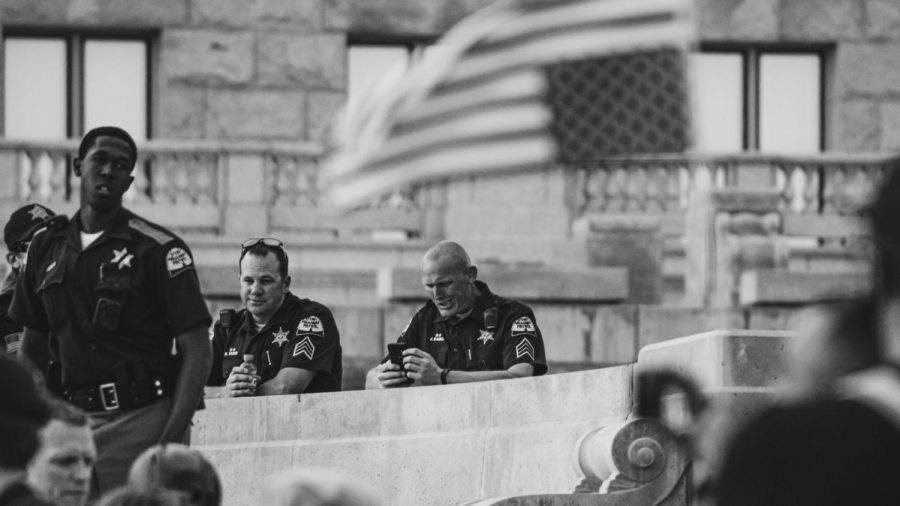Bringhurst: Fund Communities Over Cops
Utah Highway Patrol K-9 officer J. Banks (right) uses his phone as officers I. Lofton (far left) and B. Wood (center) look out over the crowd gathered to protest police brutality and corruption in front of the Utah State Capitol Building on June 4, 2020 (Photo by Mark Draper | Daily Utah Chronicle)
June 16, 2022
Salt Lake City Mayor Erin Mendenhall proposed a $21 million police budget increase, almost double 2013’s, and up 25% from last year. Mendenhall and SLCPD Chief Mike Brown justify the massive increase with their reports of an influx of calls and resignation of officers. Despite a decrease in violent crime, the 2023 budget is $40 million more than 2016’s — when violent crimes were at their highest.
Mendenhall likes to tout new policies and programs intended to reform the police department, but SLCPD’s 2021 Crime Control plan contradicts any claim of reformation. Until we can guarantee SLCPD won’t abuse the people they’re meant to protect, we shouldn’t increase their funding. And because police will always systemically be oppressors, Mendenhall should pave the way for new structures that omit police presence.
Systemic Oppression in Policing
The SLCPD shoot at racial and ethnic minorities at disproportionate rates. Within the last two years, a K9 officer ordered his police dog to attack a fully compliant Black man. Two officers shot and killed 22-year-old Bernardo Palacios-Carbajal, and all charges were dismissed. SLCPD also can’t handle mental health episodes either, as they shot a 13-year-old autistic boy experiencing a mental health crisis.
We should not increase funding to a department with a history of abuse. Police and law enforcement structures in America were built with racist intentions, and building onto a faulty foundation won’t eliminate police brutality. We shouldn’t settle for anything less than taking tangible steps towards demilitarizing the police and creating community-based public safety.
Minimal Reformation
One small silver lining to the budget proposal is the implementation of a civilian response team. The team will handle low-priority calls like roadside assistance or welfare checks. Best case scenario, it’s a step towards community-based police alternatives. Worst case scenario, civilians can play cop and dangerously step into an authority position. Civilians already abuse citizen’s arrest laws, like in the case of Ahmaud Arbery, who was shot and unjustly killed by men purportedly suspecting him of burglary.
Power should be restored to the people, but not through existing police structures. “It’s great that they’re realizing that civilians can do a lot of these jobs,” said Eliza McKinney, member of Decarcerate Utah, an organization advocating for defunding and ultimately dismantling police. “But why not actually have civilians do it rather than continue to fund the police department and have the police department in charge of these services?”
The budget increase will also fund a youth engagement program and restructure the Victim Advocate Program. Nicole Salazar-Hall, chair of the SLCPD’s Commission on Racial Equity in Policing, supports the new programs and claims they are steps toward “long-term, systemic change in the police department.” While this may sound hopeful at first, these aren’t systemic changes. The changes only expand the current department’s authority and capability. None of these changes work towards dismantling the power structure that encourages police violence, and are a fraction of the increased budget.
Allocate Funds Elsewhere
All new civilian positions account for $1.61 million of the $21 million increase. $8.3 million of the increase go towards salary raises for officers, and the proposed budget far exceeds the needs of the SLCPD.
Services for welfare checks and roadside assistance already exist outside of police forces, but don’t receive nearly as much funding. The University of Utah Neuropsychiatric Institute offers a 24-hour crisis line staffed by mental health professionals, and increased funding would allow them to respond to welfare checks. And on top of that, the Department of Transportation is equipped to handle roadside assistance or traffic stops.
The money could have alleviated unsheltered individuals, but instead it will be used to harass them. It could have been used to raise the minimum wage and help citizens survive current inflation, or help ex-convicts secure stable housing. The money could have ensured that community needs were met. Unlike increasing police presence, each of these can decrease crime.
Mayor Mendenhall did the minimum to reform SLCPD. In 2020 she signed an executive order that required that police wear body cams and use de-escalation techniques before resorting to force. Though similar policies were implemented across the nation in 2020, more people were fatally shot by police in 2021 than any previous year, with Black people still being disproportionately shot at.
It’s time to stop trying to fix what is fundamentally flawed. Funding police departments prolongs the problem. We’ve spent years devising better plans than pouring money into intentionally oppressive power structures, yet continuously contribute to a broken system.
“The point is to move funding to life,” McKinney said. “It’s replacing police with services that actually keep people safe … rather than increasing punishment and violence in neighborhoods that are already underserved by the city.”
We need to rethink law enforcement on a national level, starting from the ground up. Salt Lake City has the funds to do more, and Mendenhall has the ability. But if we continue funding the SLCPD, they will continue abusing their power.









John Hedberg • Jun 17, 2022 at 8:00 am
https://slate.com/news-and-politics/2021/10/police-reform-polls-white-black-crime.html
“One of the worst things to propose, politically, is defunding the police. Americans reject that idea by about 40 percentage points. Democrats and people of color are against it. The only idea that’s less popular is abolishing the police, which, in an Economist-YouGov poll taken this month, lost by 45 points among Black Americans, by 64 points among Democrats, and by 76 points among all voters. The problem with threatening to defund police is that the public likes police. Cops have a strong favorable rating, even among liberals.”
“In fact, most Black voters think “the defunding of police departments” is a contributing factor to violent crime.
What most Black people want is better policing, not less policing. And they’re willing to pay for it. Sixty percent of Black Americans favor “increasing funding for the police to put more officers on duty,” and 64 percent favor “deploying more police officers to street patrols.” When they’re asked how much money should be spent on “police reform,” 60 percent of Black people say more; only 17 percent say less. It’s not so much the funding or defunding that appeals to them. It’s changing the system and protecting the community.
Defunding police is an even worse message to Latinos.”
“But there’s a simpler way to get around the unpopularity of defunding police: Don’t mention police budgets at all. Don’t say reallocate, divert, or any of those words. Just talk about funding mental health services, social workers, and non-police first responders. When pollsters test these ideas on their own—without any suggestion that the money would come from cops—they’re overwhelmingly popular. In a Navigator survey taken in July, only 43 percent of voters endorsed “moving funding away from the police into other resources, like social services.” Most respondents opposed that idea. But in the same poll, 83 percent of voters, including 79 percent of Republicans, supported “investing in additional services to reduce pressure on police.””
Just some perspective from the non-Marxist disadvantaged people you claim to be defending, who disagree with you because… reality. Saying police are the enemy is like saying black people are the enemy or white people are the enemy, when it’s how individuals behave that matters. Your opinion that you can judge a whole group as oppressive, particularly given the demographic diversity among police all across the country, makes your Marxism sound as racist as it is: really racist! Maybe stop judging people by what’s on the outside, but instead how they act and what it shows about the content of our characters. We’re equal, wonderful, and diverse individual children of the Infinite Love which made us (by whatever name), and none of us have ever conformed to any homogenous group: we express who we are, each of us, distinctly in the gifts we bring and the beauty we share. Start acting like all our lives matter, since we’re family, and we do!
Focus on behavior, and you’ll sound less racist, even if you also lose some of your Marxism at the same time (which would be sad(?), considering how many millions of people Marxism murdered by genocide all over the world in the 20th century).
Best, With Love,
J Hedberg